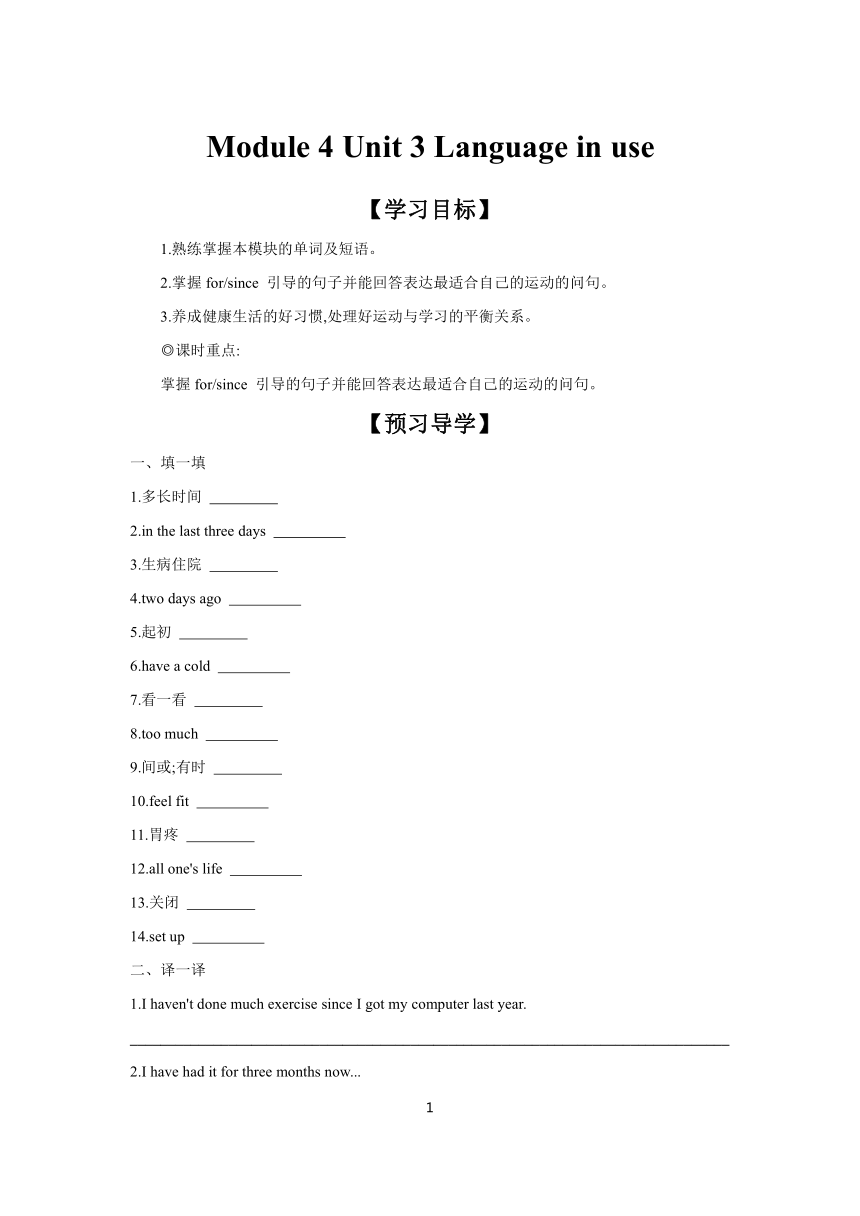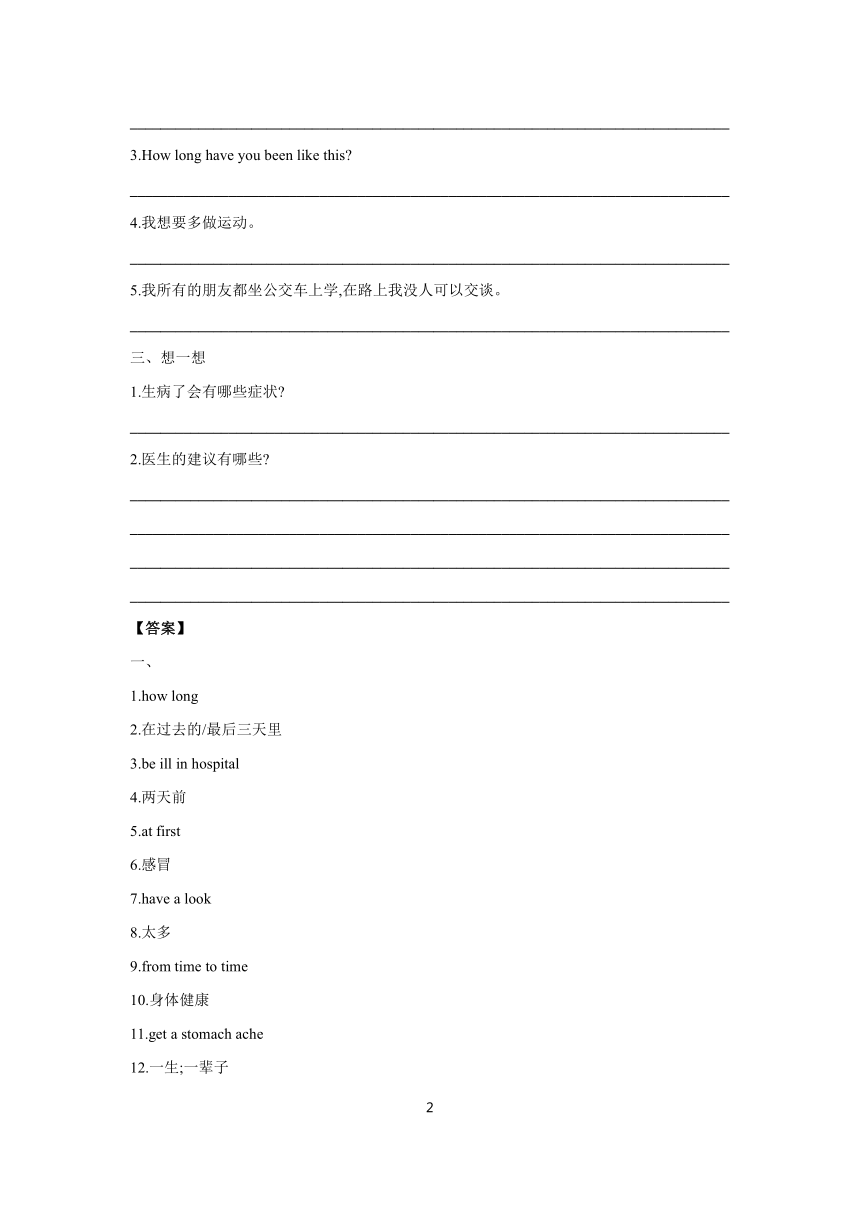Module 4 Unit 3 Language in use 学案(含答案) 2023-2024学年初中英语外研版八年级下册
文档属性
| 名称 | Module 4 Unit 3 Language in use 学案(含答案) 2023-2024学年初中英语外研版八年级下册 |

|
|
| 格式 | docx | ||
| 文件大小 | 24.6KB | ||
| 资源类型 | 教案 | ||
| 版本资源 | 外研版 | ||
| 科目 | 英语 | ||
| 更新时间 | 2024-02-27 22:10:50 | ||
图片预览



文档简介
Module 4 Unit 3 Language in use
【学习目标】
1.熟练掌握本模块的单词及短语。
2.掌握for/since 引导的句子并能回答表达最适合自己的运动的问句。
3.养成健康生活的好习惯,处理好运动与学衡关系。
◎课时重点:
掌握for/since 引导的句子并能回答表达最适合自己的运动的问句。
【预习导学】
一、填一填
1.多长时间
2.in the last three days
3.生病住院
4.two days ago
5.起初
6.have a cold
7.看一看
8.too much
9.间或;有时
10.feel fit
11.胃疼
12.all one's life
13.关闭
14.set up
二、译一译
1.I haven't done much exercise since I got my computer last year.
_______________________________________________________________________________
2.I have had it for three months now...
_______________________________________________________________________________
3.How long have you been like this
_______________________________________________________________________________
4.我想要多做运动。
_______________________________________________________________________________
5.我所有的朋友都坐公交车上学,在路上我没人可以交谈。
_______________________________________________________________________________
三、想一想
1.生病了会有哪些症状
_______________________________________________________________________________
2.医生的建议有哪些
_______________________________________________________________________________
_______________________________________________________________________________
_______________________________________________________________________________
_______________________________________________________________________________
【答案】
一、
1.how long
2.在过去的/最后三天里
3.be ill in hospital
4.两天前
5.at first
6.感冒
7.have a look
8.太多
9.from time to time
10.身体健康
11.get a stomach ache
12.一生;一辈子
13.turn off
14.建立;创立
二、
1.自从去年有了电脑,我就没做过多少运动。
2.现在我拥有它有三个月了……
3.你像这样多久了
4.I would like to take more exercise.
5.All my friends take the bus to school and I do not have anyone to talk with on the way.
三、
1.have coughs, have a cold, feel tired, be hot, have a headache/toothache/ stomach ache...
2.Drink more water and have a good rest.
Take this medicine three times a day.
You should lie in bed.
You should take more exercise...
【合作探究】
任务驱动一 小组讨论
根据教材上的活动1,在小组里结对进行讨论,注意用for/since引导的时间状语来回答。
完成任务所需的语言结构:
How long have you studied at this school
I've studied for/since...
◎学法指导:how long表示多长时间,主要用来对一段时间(如three days、 four weeks 等)提问。
任务驱动二 小组调查
1.在小组内做调查,根据教材上活动2的调查,回答问题。
2.在黑板前展示,一起交流答案。
3.独立做教材上活动3的练习,然后在小组内核对答案。
◎学法指导:注意延续性动词和非延续性动词在现在完成时中的运用。
任务驱动三 独立练习
1.独立完成教材上活动4和5的练习,并在小组内核对答案。
◎学法指导:进行这个活动时,要注意明确方框中单词、短语以及句子的含义。 2.独立完成教材上活动6的练习。小组之间核对答案,然后两人一组给出问题的建议。
任务驱动四 听力练习
1.听听力前自主阅读教材上活动7的练习,根据短文内容猜测空白处的内容。
2.仔细听短文,完成练习,两人一组核对答案。
3.再听一次短文,明确答案。
◎学法指导:听前预读是提高听力的好方法,希望大家能仔细体会,准确运用。
任务驱动五 Around the world
1.独立阅读“Around the world”,回答以下问题。
(1)When was the WHO set up
_______________________________________________________________________________
(2)Why was the WHO set up
_______________________________________________________________________________
(3)How does the WHO help people
_______________________________________________________________________________
2.把不明白的单词、短语和句子画出来,利用字典等工具解决疑难。
3.查阅有关世界卫生组织的资料,在小组内展示。
任务驱动六 Module task
1.小组内谈论问题,并以小记者的方式在小组成员间展开调查,做好记录,在此问题的基础上可以问更多的问题。例如:
How long have you done the exercise
Why do you take the exercise
Who can help you to do the exercise
2.根据调查结果,描述经常做的运动,最后找出最适合自己的运动。
3.在小组内或者全班展示并交流自己最适合的运动。
I am a(n) teenager. I like , and I take an active part in every day. I started when I was years old. I was not feeling very , but now I am in condition. I get exercise by . I believe I will be and than before.
Please join us and take exercise!
【答案】
驱动五
1.(1)In 1948.
(2)To help ordinary people all over the world, especially in developing countries.
(3)By training doctors and nurses and by teaching mothers how to take better care of their children.
【知识超市】
●Stand up and do some exercise from time to time. 站起来,时不时地做些锻炼。
from time to time意为“不时;有时”,相当于sometimes或at times。例如:
I will come to see you from time to time. 我会时不时地来看你。
[做一做]同义句改写。
From time to time I like to go for a walk in the park.
I like to go for a walk in the park.
I like to go for a walk in the park.
●The World Health Organization (WHO) was set up in 1948 to help ordinary people all over the world, especially in developing countries. 世界卫生组织是1948年建立的,其宗旨是帮助全世界,特别是发展中国家的普通人。
1.set up意为“建立;创立”。例如:
Isn't it a good idea to set up a lab of our own 建一座我们自己的实验室不是个好主意吗
2.developing意为“发展中的”,developed意为“发达的”。例如:
China is a developing country while the USA is a developed country. 中国是一个发展中国家,而美国是一个发达国家。
[做一做]单项选择。
( )1.—The organization Wild Aid is to protect wild animals.
—It has done a lot so far.
A.cheered up B.picked up
C.taken up D.set up
( )2.As we all know, Japan is a country.
A.developed B.developing
C.develops D.develop
对点自测
用括号内所给单词的适当形式填空。
1.He gave his mother much pain by (act) in such a foolish way.
2.The young man (live) alone since he graduated from college.
3.—Is your father at home
—No, I'm afraid he (go) out.
4.It's raining. Why not (take) a raincoat with you
5.Larry has put on too much weight because of his (healthy) diet.
【答案】
[做一做]
Sometimes At times
[做一做]
1~2 DA
对点自测
1.acting
2.has lived
3.has gone
4.take
5.unhealthy
【学习反思】
_______________________________________________________________________________
_______________________________________________________________________________
_______________________________________________________________________________
2
【学习目标】
1.熟练掌握本模块的单词及短语。
2.掌握for/since 引导的句子并能回答表达最适合自己的运动的问句。
3.养成健康生活的好习惯,处理好运动与学衡关系。
◎课时重点:
掌握for/since 引导的句子并能回答表达最适合自己的运动的问句。
【预习导学】
一、填一填
1.多长时间
2.in the last three days
3.生病住院
4.two days ago
5.起初
6.have a cold
7.看一看
8.too much
9.间或;有时
10.feel fit
11.胃疼
12.all one's life
13.关闭
14.set up
二、译一译
1.I haven't done much exercise since I got my computer last year.
_______________________________________________________________________________
2.I have had it for three months now...
_______________________________________________________________________________
3.How long have you been like this
_______________________________________________________________________________
4.我想要多做运动。
_______________________________________________________________________________
5.我所有的朋友都坐公交车上学,在路上我没人可以交谈。
_______________________________________________________________________________
三、想一想
1.生病了会有哪些症状
_______________________________________________________________________________
2.医生的建议有哪些
_______________________________________________________________________________
_______________________________________________________________________________
_______________________________________________________________________________
_______________________________________________________________________________
【答案】
一、
1.how long
2.在过去的/最后三天里
3.be ill in hospital
4.两天前
5.at first
6.感冒
7.have a look
8.太多
9.from time to time
10.身体健康
11.get a stomach ache
12.一生;一辈子
13.turn off
14.建立;创立
二、
1.自从去年有了电脑,我就没做过多少运动。
2.现在我拥有它有三个月了……
3.你像这样多久了
4.I would like to take more exercise.
5.All my friends take the bus to school and I do not have anyone to talk with on the way.
三、
1.have coughs, have a cold, feel tired, be hot, have a headache/toothache/ stomach ache...
2.Drink more water and have a good rest.
Take this medicine three times a day.
You should lie in bed.
You should take more exercise...
【合作探究】
任务驱动一 小组讨论
根据教材上的活动1,在小组里结对进行讨论,注意用for/since引导的时间状语来回答。
完成任务所需的语言结构:
How long have you studied at this school
I've studied for/since...
◎学法指导:how long表示多长时间,主要用来对一段时间(如three days、 four weeks 等)提问。
任务驱动二 小组调查
1.在小组内做调查,根据教材上活动2的调查,回答问题。
2.在黑板前展示,一起交流答案。
3.独立做教材上活动3的练习,然后在小组内核对答案。
◎学法指导:注意延续性动词和非延续性动词在现在完成时中的运用。
任务驱动三 独立练习
1.独立完成教材上活动4和5的练习,并在小组内核对答案。
◎学法指导:进行这个活动时,要注意明确方框中单词、短语以及句子的含义。 2.独立完成教材上活动6的练习。小组之间核对答案,然后两人一组给出问题的建议。
任务驱动四 听力练习
1.听听力前自主阅读教材上活动7的练习,根据短文内容猜测空白处的内容。
2.仔细听短文,完成练习,两人一组核对答案。
3.再听一次短文,明确答案。
◎学法指导:听前预读是提高听力的好方法,希望大家能仔细体会,准确运用。
任务驱动五 Around the world
1.独立阅读“Around the world”,回答以下问题。
(1)When was the WHO set up
_______________________________________________________________________________
(2)Why was the WHO set up
_______________________________________________________________________________
(3)How does the WHO help people
_______________________________________________________________________________
2.把不明白的单词、短语和句子画出来,利用字典等工具解决疑难。
3.查阅有关世界卫生组织的资料,在小组内展示。
任务驱动六 Module task
1.小组内谈论问题,并以小记者的方式在小组成员间展开调查,做好记录,在此问题的基础上可以问更多的问题。例如:
How long have you done the exercise
Why do you take the exercise
Who can help you to do the exercise
2.根据调查结果,描述经常做的运动,最后找出最适合自己的运动。
3.在小组内或者全班展示并交流自己最适合的运动。
I am a(n) teenager. I like , and I take an active part in every day. I started when I was years old. I was not feeling very , but now I am in condition. I get exercise by . I believe I will be and than before.
Please join us and take exercise!
【答案】
驱动五
1.(1)In 1948.
(2)To help ordinary people all over the world, especially in developing countries.
(3)By training doctors and nurses and by teaching mothers how to take better care of their children.
【知识超市】
●Stand up and do some exercise from time to time. 站起来,时不时地做些锻炼。
from time to time意为“不时;有时”,相当于sometimes或at times。例如:
I will come to see you from time to time. 我会时不时地来看你。
[做一做]同义句改写。
From time to time I like to go for a walk in the park.
I like to go for a walk in the park.
I like to go for a walk in the park.
●The World Health Organization (WHO) was set up in 1948 to help ordinary people all over the world, especially in developing countries. 世界卫生组织是1948年建立的,其宗旨是帮助全世界,特别是发展中国家的普通人。
1.set up意为“建立;创立”。例如:
Isn't it a good idea to set up a lab of our own 建一座我们自己的实验室不是个好主意吗
2.developing意为“发展中的”,developed意为“发达的”。例如:
China is a developing country while the USA is a developed country. 中国是一个发展中国家,而美国是一个发达国家。
[做一做]单项选择。
( )1.—The organization Wild Aid is to protect wild animals.
—It has done a lot so far.
A.cheered up B.picked up
C.taken up D.set up
( )2.As we all know, Japan is a country.
A.developed B.developing
C.develops D.develop
对点自测
用括号内所给单词的适当形式填空。
1.He gave his mother much pain by (act) in such a foolish way.
2.The young man (live) alone since he graduated from college.
3.—Is your father at home
—No, I'm afraid he (go) out.
4.It's raining. Why not (take) a raincoat with you
5.Larry has put on too much weight because of his (healthy) diet.
【答案】
[做一做]
Sometimes At times
[做一做]
1~2 DA
对点自测
1.acting
2.has lived
3.has gone
4.take
5.unhealthy
【学习反思】
_______________________________________________________________________________
_______________________________________________________________________________
_______________________________________________________________________________
2
同课章节目录
- Module 1 Feelings and impressions
- Unit 1 It smells delicious.
- Unit 2 I feel nervous when I speak Chinese .
- Unit 3 Language in use
- Module 2 Experiences
- Unit 1 I've also entered lots of speaking competi
- Unit 2 They have seen the Pyramids.
- Unit 3 Language in use
- Module 3 Journey to space
- Unit 1 Has it arrived yet?
- Unit 2 We have not found life on any other planet
- Unit 3 Language in use
- Module 4 Seeing the docto
- Unit 1 I haven't done much exercise since I got m
- Unit 2 We have played football for a year now
- Unit 3 Language in use
- Module 5 Cartoons
- Unit 1 It's time to watch a cartoon.
- Unit 2 Tintin has been popular for over eighty yea
- Unit 3 Language in use
- Revision module A
- Module 6 Hobbies
- Unit 1 Do you collect anything ?
- Unit 2 Hobbies can make you grow as a person.
- Unit 3 Language in use
- Module 7 Summer in Los Angeles
- Unit 1 Please write to me and send me some photos
- Unit 2 Fill out a form and come to learn English
- Unit 3 Language in use
- Module 8 Time off
- Unit 1 I can hardly believe we are in the city ce
- Unit 2 We thought somebody was moving about
- Unit 3 Language in use
- Module 9 Friendship
- Unit 1 Could I ask if you've mentioned this to he
- Unit 2 I believe that the world is what you think
- Unit 3 Language in use
- Module 10 On the radio
- Unit 1 I hope that you can join us one day
- Unit 2 It seemed that they were speaking to me in
- Unit 3 Language in use
- Revision module B
